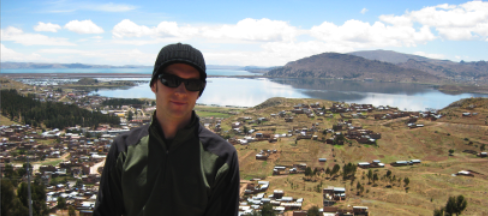Aaron Clauset: Difference between revisions
From Santa Fe Institute Events Wiki
No edit summary |
No edit summary |
||
| (9 intermediate revisions by 2 users not shown) | |||
| Line 1: | Line 1: | ||
I'm | [[image:aaron_clauset_photo_2.png]] | ||
I'm an Omidyar Fellow at the Santa Fe Institute, and I'll be an assistant professor in Computer Science at the University of Colorado, Boulder starting Fall 2010. I received my PhD in Computer Science in 2006 from the University of New Mexico, and my BS in Physics in 2001 from Haverford College. I attended the CSSS 2003 in Santa Fe, and have lectured at both the Santa Fe and Beijing Complex Systems Summer Schools. | |||
My research interests are pretty broad, and currently include statistical patterns in complex systems, complex networks (structure, function, methods; technological, biological and social), statistical inference and machine learning, power-law distribtions (data, mechanisms); law-like behavior and prediction in conflict (terrorism, wars), human social dynamics; the Internet (structure, routing, security); adaptive and evolutionary computation; self-organization; robustness; innovation; and algorithmic game theory. | |||
Much of my work focuses on understanding how to separate what is contingent from what is constrained or structured in complex phenomena, and I apply this general idea to social, biological, and technological systems. My work has a strong emphasis on discovery and modeling, using both numeric and analytic tools, and it draws heavily on ideas and tools from computer science, statistics, machine learning, and statistical physics. Most recently, I've been studying the large-scale structure of complex networks, the mechanisms and constraints that give rise to morphological diversity at the species level, and patterns in global terrorism. | |||
[[http://www.santafe.edu/~aaronc/ My homepage]] | |||
<!-- | |||
=== Santa Fe School === | |||
This year, Clauset will deliver a lecture on Markov chain Monte Carlo methods for simulation and inference in complex systems. To be best prepared for the lecture, you should take a look at these papers. The first is the most relevant, with the others being more background material. | |||
* [[Media:CMN_08_Hierarchy_Preprint.pdf|"Hierarchical structure and the prediction of missing links in networks." Clauset, Moore and Newman. <i>Nature</i> <b>453</b>, 98-101 (2008).]] | |||
* [http://www-personal.umich.edu/~mejn/nbook/ <i>Monte Carlo Methods in Statistical Physics.</i> Newman and Barkema. Oxford University Press (1999).] | |||
* [http://citeseer.ist.psu.edu/andrieu03introduction.html "An Introduction to MCMC for Machine Learning." Andrieu, de Freitas, Doucet and Jordan. <i>Machine Learning</i> <b>50</b>, 5-43 (2003).] | |||
=== Beijing School === | |||
Clauset will deliver three lectures; two will cover the basics of complex networks and network analysis, and one will cover the estimation and validation of power-law distributions in empirical data. To be best prepared for the lecture, you should take a look at these two papers. | |||
* [[Media:CSN_07_PowerlawDistributionsInEmpiricalData_arxiv.pdf|"Power-law distributions in empirical data." A. Clauset, C. R. Shalizi and M. E. J. Newman. arXiv:0706.1062 (2007).]] | |||
* [http://siamdl.aip.org/getpdf/servlet/GetPDFServlet?filetype=pdf&id=SIREAD000045000002000167000001 "The structure and function of complex networks." M. E. J. Newman, ''SIAM Review'' '''45''', 167-256 (2003)] | |||
--> | |||
Latest revision as of 06:17, 8 July 2009
I'm an Omidyar Fellow at the Santa Fe Institute, and I'll be an assistant professor in Computer Science at the University of Colorado, Boulder starting Fall 2010. I received my PhD in Computer Science in 2006 from the University of New Mexico, and my BS in Physics in 2001 from Haverford College. I attended the CSSS 2003 in Santa Fe, and have lectured at both the Santa Fe and Beijing Complex Systems Summer Schools.
My research interests are pretty broad, and currently include statistical patterns in complex systems, complex networks (structure, function, methods; technological, biological and social), statistical inference and machine learning, power-law distribtions (data, mechanisms); law-like behavior and prediction in conflict (terrorism, wars), human social dynamics; the Internet (structure, routing, security); adaptive and evolutionary computation; self-organization; robustness; innovation; and algorithmic game theory.
Much of my work focuses on understanding how to separate what is contingent from what is constrained or structured in complex phenomena, and I apply this general idea to social, biological, and technological systems. My work has a strong emphasis on discovery and modeling, using both numeric and analytic tools, and it draws heavily on ideas and tools from computer science, statistics, machine learning, and statistical physics. Most recently, I've been studying the large-scale structure of complex networks, the mechanisms and constraints that give rise to morphological diversity at the species level, and patterns in global terrorism.

